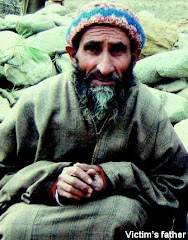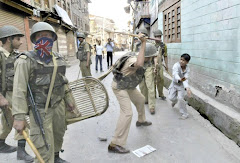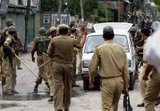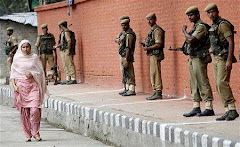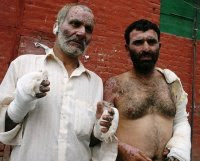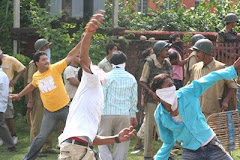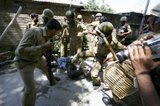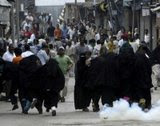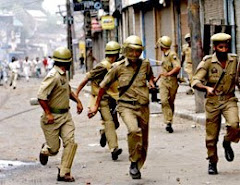Courtesy: Times of India dt June 14th, 2009 by Sanjay KakThose who use the media filter to try to understand what is happening in Kashmir should realize they're looking at a shadow play. A curtain lies between events and us. What is played out on the screen depends on who manipulates the source of light.
Last summer, the Valley was overwhelmed by several months of unprecedented non-violent public protest. It was triggered by the complicated Amarnath land issue, but on the streets the people were saying "Hum kya chahte? Azadi!" We are hearing this again this summer, triggered by the rape and murder of two young women from Shopian in south Kashmir. Only the stone deaf could miss the cry.
Between these two summer uprisings came the Assembly elections of December. As everyone braced for a boycott, people did turn out to vote. This surprise turnout was presented as nothing short of a miracle and we were informed that this was "a vote for Indian democracy". Those who wondered why people who had braved bullets only a month ago should suddenly queue up to vote were reminded that Kashmiris were an unpredictable, even contrary, people.
In fact, there is a frightening consistence about the Kashmiri chant for decades: "Hum kya chahte? Azadi!" Protests have begun for all sorts of reasons but they are a manifestation of the simmering anger always close to the surface.
The current round of protests were given a head-start by the distinctly amateur vacillations of the state chief minister, not least his puzzling shifts on what may have actually happened to Nilofar, 22, and her sister-in-law Asiya, 17, on the night of May 29. Well-intentioned though he may be, Omar Abdullah seems very badly advised, or else possessed of a political death-wish.
In its election campaign the National Conference made a point of underlining that it was seeking a mandate for development, for bijli, sadak, pani. It made no claim to settling masla-e-Kashmir or the Kashmir issue. But once the elections were over, they went along with the Indian establishment, which trumpeted the turnout as a decisive mandate in India's favour. The inability of Omar Abdullah's government to reach out to the people of the Valley in the past fortnight is a timely reminder of the dangers of that delusion. In just a little over 10 days, the protests have damaged the patina of normalcy that the election 'success' painted on a deeply troubled situation.
In the middle of all this, but almost buried by events, the J&K police announced the arrest of Constable Nazir Ahmed of the India Reserve Police battalion for allegedly raping a minor girl in Baramulla in north Kashmir. (They admitted the constable was a former Personal Security Officer of Ghulam Hassan Mir, legislator and former minister). Days after the incident, a scuffle between the families of the victim and the policeman led to the tragic killing of the victim's grandmother.
Both incidents of the past fortnight must be placed next to one from a few years ago, when the infamous "sex scandal" led to huge protests, bringing Srinagar to a grinding halt. That was a tawdry tale of the sexual exploitation of vulnerable women, including the prostitution of minors. It was on a massive scale, with the involvement of politicians, senior bureaucrats, police and paramilitary officers. The scandal exposed the ugly networks of power and oppression, which prop up the structures of control in Kashmir. It also laid bare the vulnerability of women all over the Valley, prey to the brutal arrogance unleashed by 20 years of intense militarization and unbridled power.
It's a good time to remember that the acquisition of land for the Amarnath yatra was only the spark that set off last summer's protests. But the real fuel was widespread resentment about the fact that thousands of acres of agricultural, orchard and forest land is under occupation by the army and paramilitary forces, housing their feared camps and cantonments and vast logistics bases. The Kashmiris' behaviour then turns out to be underpinned by a fairly straightforward political reason: we don't need to delve into their fragile 'psyche'.
This week, the lights behind the curtain are being moved around to give the illusion of change: the CRPF's duties are to be handed over to the J&K police. If true, this will need massive local police recruitment and give a disturbing new twist to the Indian government's promise of employment to young Kashmiris. (However, from the Establishment's point of view, a policeman in every home may well be a solution to Kashmir's troubles.)
But this change of guard will not alter the lives of ordinary people. They do not care if the oppressive figure of the soldier wears the uniform of the Indian Army, its paramilitary forces, or is their neighbour in brand new fatigues. Such shallow transformation is not new: people remember the 'disbanding' of the dreaded Special Operations Group, which was simply merged into regular police operations; or the highly public way in which the CRPF replaced the BSF in Srinagar, leaving the countryside in the Army's iron grip.
This summer's protest is not just about the rape and murder of two women, the violation of human rights, or even the repeal of some draconian law. The shadow play must not distract us from the real issue, which is the extraordinary and intolerable militarization of Kashmir.
Sanjay Kak is a filmmaker whose most recent documentary 'Jashn-e-Azadi' explores the conflict in Kashmir













